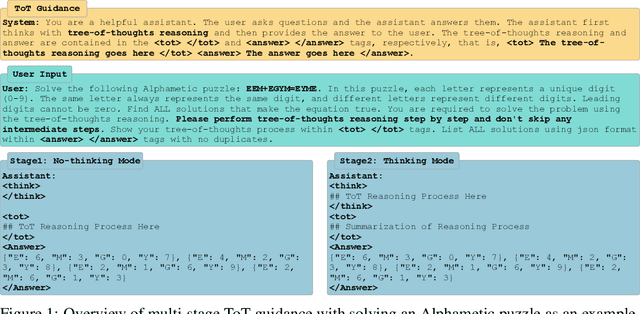Rui Ming
ToTRL: Unlock LLM Tree-of-Thoughts Reasoning Potential through Puzzles Solving
May 19, 2025



Abstract:Large language models (LLMs) demonstrate significant reasoning capabilities, particularly through long chain-of-thought (CoT) processes, which can be elicited by reinforcement learning (RL). However, prolonged CoT reasoning presents limitations, primarily verbose outputs due to excessive introspection. The reasoning process in these LLMs often appears to follow a trial-and-error methodology rather than a systematic, logical deduction. In contrast, tree-of-thoughts (ToT) offers a conceptually more advanced approach by modeling reasoning as an exploration within a tree structure. This reasoning structure facilitates the parallel generation and evaluation of multiple reasoning branches, allowing for the active identification, assessment, and pruning of unproductive paths. This process can potentially lead to improved performance and reduced token costs. Building upon the long CoT capability of LLMs, we introduce tree-of-thoughts RL (ToTRL), a novel on-policy RL framework with a rule-based reward. ToTRL is designed to guide LLMs in developing the parallel ToT strategy based on the sequential CoT strategy. Furthermore, we employ LLMs as players in a puzzle game during the ToTRL training process. Solving puzzle games inherently necessitates exploring interdependent choices and managing multiple constraints, which requires the construction and exploration of a thought tree, providing challenging tasks for cultivating the ToT reasoning capability. Our empirical evaluations demonstrate that our ToTQwen3-8B model, trained with our ToTRL, achieves significant improvement in performance and reasoning efficiency on complex reasoning tasks.
On-Policy Optimization with Group Equivalent Preference for Multi-Programming Language Understanding
May 19, 2025Abstract:Large language models (LLMs) achieve remarkable performance in code generation tasks. However, a significant performance disparity persists between popular programming languages (e.g., Python, C++) and others. To address this capability gap, we leverage the code translation task to train LLMs, thereby facilitating the transfer of coding proficiency across diverse programming languages. Moreover, we introduce OORL for training, a novel reinforcement learning (RL) framework that integrates on-policy and off-policy strategies. Within OORL, on-policy RL is applied during code translation, guided by a rule-based reward signal derived from unit tests. Complementing this coarse-grained rule-based reward, we propose Group Equivalent Preference Optimization (GEPO), a novel preference optimization method. Specifically, GEPO trains the LLM using intermediate representations (IRs) groups. LLMs can be guided to discern IRs equivalent to the source code from inequivalent ones, while also utilizing signals about the mutual equivalence between IRs within the group. This process allows LLMs to capture nuanced aspects of code functionality. By employing OORL for training with code translation tasks, LLMs improve their recognition of code functionality and their understanding of the relationships between code implemented in different languages. Extensive experiments demonstrate that our OORL for LLMs training with code translation tasks achieves significant performance improvements on code benchmarks across multiple programming languages.
Efficient OpAmp Adaptation for Zoom Attention to Golden Contexts
Feb 18, 2025Abstract:Large language models (LLMs) have shown significant promise in question-answering (QA) tasks, particularly in retrieval-augmented generation (RAG) scenarios and long-context applications. However, their performance is hindered by noisy reference documents, which often distract from essential information. Despite fine-tuning efforts, Transformer-based architectures struggle to prioritize relevant content. This is evidenced by their tendency to allocate disproportionate attention to irrelevant or later-positioned documents. Recent work proposes the differential attention mechanism to address this issue, but this mechanism is limited by an unsuitable common-mode rejection ratio (CMRR) and high computational costs. Inspired by the operational amplifier (OpAmp), we propose the OpAmp adaptation to address these challenges, which is implemented with adapters efficiently. By integrating the adapter into pre-trained Transformer blocks, our approach enhances focus on the golden context without costly training from scratch. Empirical evaluations on noisy-context benchmarks reveal that our Qwen2.5-OpAmp-72B model, trained with our OpAmp adaptation, surpasses the performance of state-of-the-art LLMs, including DeepSeek-V3 and GPT-4o.
A Deep Neural Network Based Approach to Building Budget-Constrained Models for Big Data Analysis
Feb 23, 2023



Abstract:Deep learning approaches require collection of data on many different input features or variables for accurate model training and prediction. Since data collection on input features could be costly, it is crucial to reduce the cost by selecting a subset of features and developing a budget-constrained model (BCM). In this paper, we introduce an approach to eliminating less important features for big data analysis using Deep Neural Networks (DNNs). Once a DNN model has been developed, we identify the weak links and weak neurons, and remove some input features to bring the model cost within a given budget. The experimental results show our approach is feasible and supports user selection of a suitable BCM within a given budget.
 Add to Chrome
Add to Chrome Add to Firefox
Add to Firefox Add to Edge
Add to Edge